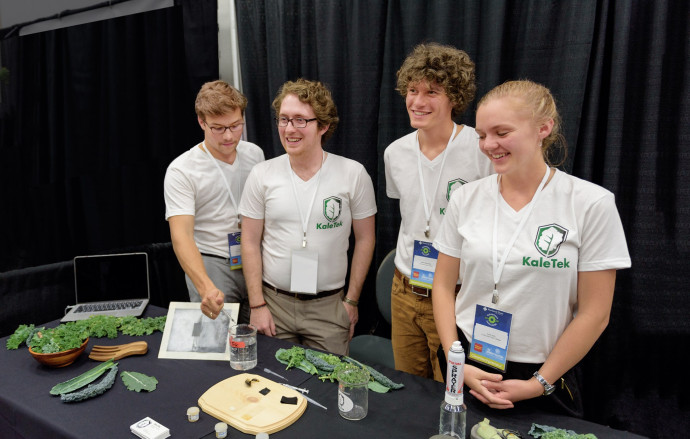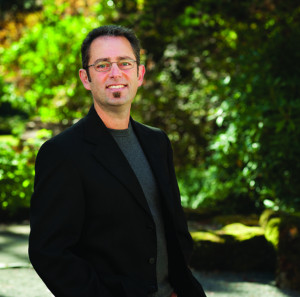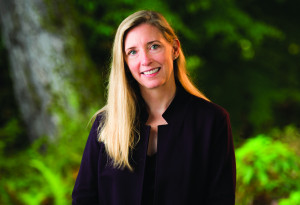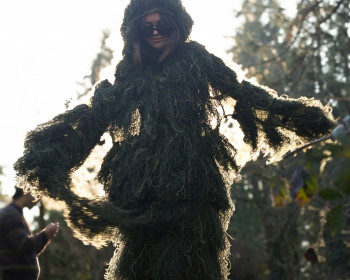A Kale Tale

Entrepreneurial students develop a kale-based waterproofing agent that may have applications for everything from apparel to pets.
by Jonathan Frochtzwajg BA ’09
It was a dark and stormy week—in other words, it was a typical Portland winter. As rain poured down on Palatine Hill, students in the Technologies of the Future course set out to interview their peers, seeking to identify campus problems in need of entrepreneurial solutions.
Their sodden subjects kept coming up with one problem, in particular: staying dry. “People were upset that their pants were wet, their shoes were wet —that everything was wet, because it’s Portland,” recalls Blake Slattengren BA ’18, one of the student interviewers.
That got Slattengren and some of his classmates thinking about a lesson that Professor of Biology Kellar Autumn had taught earlier in the course. Lecturing on biologically inspired design, Autumn had discussed the lotus flower, which remains pristine even as it floats upon filthy water thanks to its waxy, hydrophobic surface. Slattengren and his classmates soon learned that the surface of the more readily available kale plant also features a water-repellent wax. They wondered: might this trendy superfood offer an all-natural solution for their peers’ rainy-day woes?

A year later, that question has sprouted into a promising business venture: Kale Tek, which proposes to employ extracted kale wax crystals for plant-based waterproofing of everything from shoes to hair to dogs. Made up of five current and former Lewis & Clark students—Ian Dechow BA ’16, Emily Kelley BA ’16, Joshua Proto BA ’16, Jonah Svihus BA ’18, and Slattengren— the class-project-turned-startup was a finalist in Portland State University’s competitive Cleantech Challenge last summer, and the concept has already attracted the interest of a local shoe company. Kale Tek’s potential is “huge,” says Juan Barraza, program manager of the PSU Cleantech Challenge. “It’s an easy-to-understand concept, it’s appealing, and it has the potential to scale and impact millions of lives.”
An Interdisciplinary ‘Sandbox’

“The course is kind of a sandbox for students to take what they’ve learned in their majors, apply it, and learn to work together,” he says. “Whether they’re science students, or humanities students, or social science students, all those disciplines have something of value to contribute.”
Students in Technologies of the Future learn about the psychology of creativity and take part in design-thinking exercises as they develop their own business or social entrepreneurship concepts. In past years, their ideas have ranged from the technical —an external autofocusing apparatus for older cameras—to the silly yet pragmatic—edible “rubber” bands to keep your burrito from unraveling.
“Every year, Kellar’s students come up with remarkable plans,” says Amelia Wilcox, acting academic director of the Center for Entrepreneurship and assistant professor with term of psychology. “We have many students who love the life of the mind and also like to roll up their sleeves and do stuff. The Center for Entrepreneurship allows our students to put the liberal arts into action.”

The Liberal Arts Advantage
The group began looking beyond the course when Wilcox learned about their idea and encouraged them to apply to the PSU Cleantech Challenge. Selected last June as one of 10 finalists (out of more than twice as many applicants), the Kale Tek team received $2,500 in seed money and was paired with a mentor from the local business community. Over the next 90 days, team members worked with a professional extractor to develop a more sustainable, carbon dioxide–based extraction process—their original method involved hexane, a harsh chemical—and otherwise refine their idea.
Many of Kale Tek’s competitors boasted business or engineering backgrounds, making the team of liberal arts students something of an anomaly. But Barraza argues that a liberal arts education is a leg up in entrepreneurship, equipping innovators with the “empathy skills” needed to understand and connect with consumers. “In today’s economy and the future economy, the products that are able to connect with the end user are the ones that are going to succeed.” he says. “Sometimes engineer-heavy or business-oriented teams don’t see that.”
Today, the team is seeking additional funding as it works out the details of its concept: What is the optimal process for extracting the wax crystals? Do the reconstituted crystals work better in a solution or an aerosol spray? How long do they last in real-world conditions?
Though Kale Tek ultimately didn’t win the Cleantech grand prize, the challenge helped the team work together more effectively and make valuable connections, Slattengren says. “This whole process has been instrumental for opening so many doors in the Portland area.” Today, the team is seeking additional funding as it works out the details of its concept: What is the optimal process for extracting the wax crystals? Do the reconstituted crystals work better in a solution or an aerosol spray? How long do they last in real-world conditions?
Wilcox is confident the group will keep progressing. “They’re quite willing to do what it takes to take it to the next step, and the next step, and the next,” she says. Whatever the future holds, though, Kale Tek has already fulfilled the Center for Entrepreneurship’s vision of interdisciplinary applied learning.
“These students represent a host of different disciplines, yet they were able to come together and create this really interesting idea. They mastered the science of it—and approached the business of it—with the same degree of rigor,” says Wilcox. “It’s a wonderful example of what can happen when different disciplines from the college work together to create something great.”
Jonathan Frochtzwajg BA ’09 is a freelance journalist—and former Pioneer Log editor—whose work has been published in the Oregonian, Portland Monthly, and Oregon Business, among others.
More Newsroom Stories
Public Relations is located in McAfee on the Undergraduate Campus.
MSC: 19
email public@lclark.edu
voice 503-768-7970
Public Relations
Lewis & Clark
615 S. Palatine Hill Road MSC 19
Portland OR 97219

